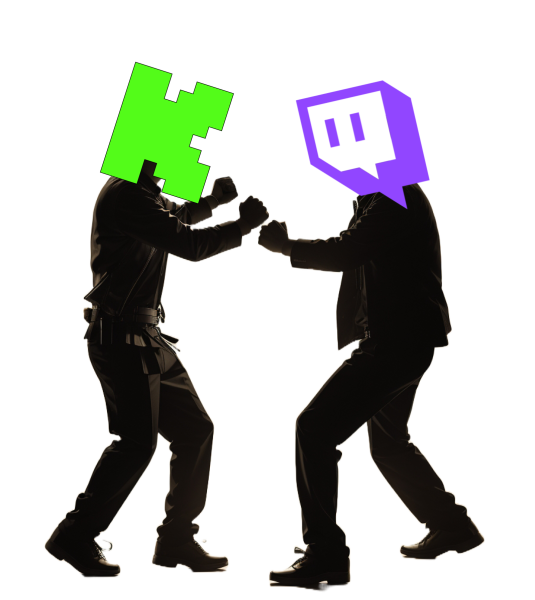
Trigger Warning: This article has vulgar language and mentions of suicide and violence.
Live-streaming content online has become increasingly popular in today’s ever-evolving digital entertainment landscape. Content most seen on streaming platforms range from video games, cooking, traveling, or even just chatting with invested viewers.
Of these platforms, Amazon-owned live-streaming service Twitch has sat at the top of the streaming throne for quite some time and has had some, but mostly unsuccessful, competition. With the emergence of live-streaming competitors such as YouTube Gaming, Microsoft-owned Mixer (which ended up shutting down), and Facebook Live, they have come close to the success that Twitch built up for itself.
Twitch was not just for small content creators wishing to grow a large community of fans; it was also the official place to host massive tournaments such as chess, boxing, or gaming events in which hundreds of thousands of people would tune in to watch.
According to Influencer Marketing Hub, Twitch’s top streamers have earned millions of dollars from the platform. Their revenue comes primarily from advertisements, supporters who can subscribe to their favorite streamers or donate. Subscribing to a streamer costs a minimum of $5 per month in exchange for viewer benefits such as participating in ‘sub-only chats’ and gaining access to special emotes.
It is through their supporters and fans that revenue is earned, but there is a slight catch.
Although Twitch does not take a cut from donations given to the streamer, they do take a cut in subscriptions and ad revenue. If a single sub is worth $5, the streamer would only receive $3. For partnered streamers who average at least 100 concurrent views per stream, Twitch offers a 70/30 revenue split.
However, as of last year, Twitch announced that it would be switching its business model from a 70/30 cut to a 50/50 cut. Meaning that for every $5 subscription, the streamer would only receive $2.50. They have also announced that they will no longer be allowing gambling streams, which started becoming extremely popular with cryptocurrencies and gambling sites that would give streamers thousands of dollars to gamble with on their site for viewers to watch and try out the site.
These back-to-back announcements did not sit well with most of Twitch users and supporters.
The backlash from this announcement was immense that an entirely new streaming service emerged from the controversy surrounding Twitch and has lured in disenchanted Twitch streamers with a sweet-sounding deal.
Kick streaming, a new and fierce competitor to Twitch, offers its streamers a 95/5 subscription revenue split. On top of this, Kick also promises to soon pay streamers a flat rate based on the hours they stream.
As of early September, Kick has yet to roll out its hourly pay program.
Although it is common for social platforms to use a bait-and-switch tactic to attract users, immediately following the announcement, prominent Twitch streamers broke their contract with Twitch and decided to join Kick.
These streamers were fed up with the revenue changes, among other criticisms with the company such as unfair treatment in the form of temporary or permanent suspension for actions that did not warrant punishment.
Twitch slowly kept digging itself deeper and deeper into a hole. With a competitor allowing streamers to keep more of the money they have earned, why not switch to a different platform? Well, this is where things get a little controversial for Kick as well.
Although Twitch has been accused of treating streamers poorly and cutting their earned revenue, Kick is accused of having an extremely lenient moderation policy. According to Kick, they have two rules, “no pornography and no hate speech.”
However, this policy does not seem to be enforced, and in fact, many accuse the platform of enabling and promoting hate speech, sexism, homophobia, transphobia, and racism.
Throughout the last year of Kick’s emergence, controversial personalities are at the top of the platform. Generally, people who do not support the banned streamers who have repeatedly made bigoted statements will not support Kick or stream on the platform.
So, what reputation has Kick received? An absolute toxic wasteland filled with some of the most degenerate people in online culture.
Most of Kick’s top streamers have been banned on Twitch once or several times and will cry out about cancel culture when faced with specific punishments for the words they say or the content they have shown to thousands of people, children included.
At the top of Kick’s success, the person who has reached 14% of Kick’s total hours watched in April which accounted for seven million hours according to Stream Elements, is the streamer known as Adin Ross.
This is a man who has been repeatedly banned from Twitch for streaming sexual content, telling other creators to kill themselves, body-shaming OnlyFans models, going on transphobic rants and claiming that his pronouns are “kill/them,” following up by saying that anyone who picks their pronouns are “self-entitled… making the world a sh-ttier place,” with many other repulsive statements and acts.
Ross even created a burner Twitter, now X, account dedicated to attacking others, such as gaming commentator Jake Lucky, who Ross Tweeted at him saying, “Jake Lucky deserves to be stoned to death, on God. You deserve to be bullied.”
On that same X account, he told political commentator and popular Twitch streamer Hasan to “please k— yourself I’ll do anything,” and claims that Hasan is “pushing a gay agenda for little boys and girls… you’re going to hell.” It is essential to note here that some of his viewers are children who are being exposed to this content.
“We can do whatever the f— we want,” Adin tells his followers about Kick. “There is no terms of service. You guys can say whatever you want in my chat.”
As of September, Ross has 684,587 followers and has hit an all-time record of 189,742 concurrent viewers in just one stream.
This man has become Kick’s poster child, often interacting and engaging with the official Kick X account. Even after breaking Kick’s terms of service not once but twice through streaming sexual content, he is untouched by any punishment and continues to stream his regular content. Some of this content is still on his channel in the form of clips, which are small, highlighted stream segments that are saved for future viewing.
After many demanded an apology from Adin, he announced that he would be going live in a future stream to address the criticism, in which he said that he “apologizes for absolutely f—ing nothing.” He continued sarcastically, “I would never ever in any type of way want anyone to ever harm themselves or do something violent with something I’ve said.”
Building a friendly community of fans and followers on Kick is difficult, especially after switching from Twitch and having to start over on a different platform. Not everyone will transition to support their favorite streamers, and many Twitch users who join Kick will be met with an unsettling environment of toxicity and bigotry from regular Kick users.
Twitch’s top streamers have already made the move and signed contracts with Kick and terminated their contract with Twitch removing their partnership status. Unfortunately, Twitch does not allow for multi-platform streaming while being a partnered streamer, meaning that old supporters from Twitch will only be able to watch their favorite streamers if they create a Kick account.
It is unknown what the future holds for Kick, but for streamers and content creators looking to make the most money, Kick is their answer, even if it means loosening ethical beliefs and morals.




